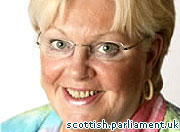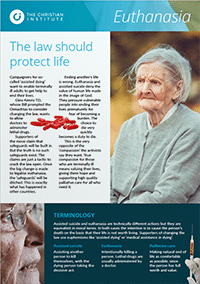We will never accept that some human lives are unworthy of life, 47 GPs have said in a letter to a national newspaper, voicing their concern over a bill to legalise assisted suicide in Scotland.
Writing to The Scotsman the doctors cautioned that, if the bill was passed, people may consider assisted suicide or euthanasia if they felt they were a “burden” on their families.
The GPs said they could not support any provisions which may encourage patients to believe “that they have lost their inherent dignity or which may imply, however subtly, that society might be better off without them”.
Dignity
The End of Life Assistance (Scotland) Bill is not expected to become law. It proposes to allow the terminally ill to seek assistance in ending their lives.
It would also effectively legalise euthanasia by allowing doctors to administer drugs to terminally ill patients who were incapable of taking them.
The medics branded the proposed legislation “dangerous”.
Vulnerable
The 47 GPs said the move could lead to “many elderly, depressed or other vulnerable people” who feel they are a “burden” on their families to consider assisted suicide or euthanasia.
“In this regard”, the doctors wrote, “we cannot support any provisions which may encourage any of our patients, and especially those who are frail and vulnerable, to believe that they have lost their inherent dignity or which may imply, however subtly, that society might be better off without them”.
The medics also said that to accept that some human lives are unworthy of life would be “contrary to all historical codes of medical ethics and the policy of the Royal College of General Practitioners”.
“Assisted suicide and euthanasia promote the idea that society should be given the power to end the lives of those who consider their own lives as worthless or meaningless”, they said.
Groundswell
In June it was revealed that over 14,000 people had signed a petition against Mrs MacDonald’s Bill.
The petition was organised by campaign group Care Not Killing, an alliance composed of churches, bioethicists, medical groups and disability groups.
John Deighan, parliamentary officer for the Roman Catholic Church in Scotland, at the time said it represented a “real groundswell of Scottish opinion”.
Last week a Scottish Parliament committee which was considering the legislation concluded that it was “not convinced” the law needed changing.
Caution
In January a BBC Scotland survey of two thirds of MSPs, revealed that 53 MSPs were against the Bill, 17 were in favour of it while 20 were still undecided.
And in September, Dr Tony Calland, Chair of the BMA’s Medical Ethics Committee, warned of the danger posed by the Bill.
He cautioned: “Once you’ve crossed the rubicon of changing the law to allow premeditated hastening of the death of another person, you can never go back.”


